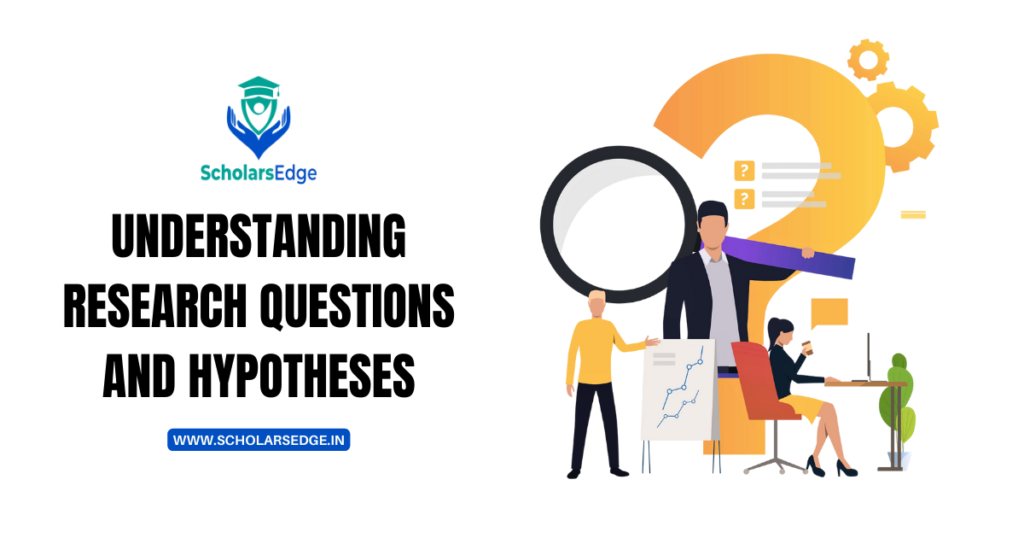
Formulating clear and precise research questions and hypotheses is essential for conducting effective and impactful studies. These elements provide the foundation for your research, guide your investigation, and help ensure that your work is focused, coherent, and meaningful. In this blog post, we will delve into the definitions and purposes of the research questions and hypotheses, explore their key differences, and provide practical advice on how to develop them. We will also discuss the importance of the research objectives and how to find and write hypotheses in the research articles.
Introduction
Research Question: A research question is a clear and focused question that guides your research. It identifies the specific aspects of a topic that you want to explore and sets the direction for your study.
Hypothesis: A hypothesis is a testable statement that predicts the relationships between variables. It is based on existing theories and knowledge and serves as a foundation for testing and validation through scientific methods.
Research Objectives: Research objectives are the specific goals that your research aims to achieve. They provide direction and focus, help structure your study, and ensure that it addresses relevant issues effectively.
Research Question vs. Hypothesis
Definition and Purpose
Research Question: A research question was designed to explore the specific aspects of a topic. It is often used in exploratory research to identify gaps in existing knowledge and to guide the direction of the study. A well-formulated research question should be specific, measurable, and researchable within the project constraints.
Hypothesis: A hypothesis, on the other hand, is a predictive statement that can be tested through scientific methods. It proposes a relationship between variables and is often used in confirmatory research to validate or invalidate specific predictions. The hypothesis should be clear, concise, and based on existing theories and knowledge.
Key Differences
Structure: Research questions are written as questions, whereas the hypotheses are statements. For example, a research question might be, “What is the impact of social media on adolescent self-esteem?”.” In contrast, a hypothesis could be, “Increased use of social media leads to lower self-esteem among adolescents.”
Purpose: Research questions are exploratory and aim to identify and understand various aspects of a topic. Hypotheses are confirmatory and designed to test specific predictions and validate theories.
Flexibility: Research questions are often more flexible and evolve as the study progresses. Once formulated, hypotheses are typically more rigid and are tested through systematic methods.
What Are the Objectives of Research?
Definition of Research Objectives
Research objectives are the specific goals that your study aims to achieve. They provide a clear framework for what you intend to investigate and help keep your research focused and aligned with your overall aim.
Importance
Provides Direction and Focus: Clear research objectives help define the scope of your study, ensuring that you remain focused on relevant issues and avoid straying into unrelated areas.
Helps in Structuring the Study: Objectives guide the development of your research design, methodology, and data collection processes, making your study more coherent and structured.
Examples
Descriptive Objectives: These aim to describe the characteristics or phenomena of a specific topic. For example, “To describe the demographic characteristics of social media users.”
Explanatory Objectives: These aim to explain the relationships or causes behind phenomena. For example, “To explain the impact of social media use on adolescent self-esteem.”
Evaluative Objectives: These aim to assess the effectiveness or impact of interventions or programs. For example, “To evaluate the effectiveness of a social media literacy program on reducing negative self-esteem among adolescents .
Research Hypothesis
Types of Hypotheses
Associative Hypothesis: This type of hypothesis proposes a connection between variables without implying causation. For example, “There is an association between study time and exam scores”.
Causal Hypothesis: This suggests a cause-and-effect relationship between variables. For example, “Increased study time leads to higher exam scores”.
Empirical Hypothesis: Based on direct observation or experiments, this hypothesis can be tested with real-world evidence. For example, “Increasing the dosage of a medication will lead to faster recovery times for patients”.
Statistical Hypothesis: This is a statement about a population parameter that is tested statistically. For example, “The new medication does not affect on patient recovery times”.
How to Develop a Hypothesis
- Identify the Research Problem: Clearly define the area of interest or problem you want to investigate.
- Conduct a Literature Review: Review existing literature to understand the current state of knowledge in the field and identify gaps.
- Formulate the Research Question: Based on your literature review, create a specific and concise research question.
- Identify Variables: Determine the key variables involved in your research question and construct your hypothesis around them.
Components of Research Objectives
Research objectives should be clear, concise statements that align with your research question and hypothesis. They should specify what the research intends to achieve and guide the overall direction of the study.
How to Write Research Objectives
- Start with a Clear Understanding of the Research Question: Ensure that your objectives directly address your research question.
- Use Action Verbs: Describe what will be achieved using specific, measurable terms.
- Apply SMART Criteria: Ensure that your objectives are Specific, Measurable, Achievable, Relevant, and Time-bound (Help For Assessment) (Scribbr).
How to Find Hypotheses in Research Articles
Steps to Identify Hypotheses
- Locate the Introduction or Literature Review Section: Hypotheses are often introduced in these sections, where the research problem is discussed.
- Look for Statements Starting with Phrases Like “We Hypothesize That” or “The Hypothesis Is. “These phrases often signal the presence of a hypothesis.
- Check the Methodology Section: Hypotheses guiding the study design are typically outlined here.
Research Question Examples
Examples of Good Research Questions
Quantitative: “What is the effect of X on Y?” For example, “What is the impact of social media use on adolescent self-esteem?”
Qualitative: “How do individuals perceive the impact of X on their lives?” For example, “How do adolescents perceive the impact of social media on their self-esteem?”
Tips for Writing Research Questions
- Focus on a Specific Problem: Ensure that your question addresses a clearly defined issue.
- Ensure the Question is Researchable and Feasible: Make sure you can realistically investigate the question within the constraints of your study.
- Avoid Vague Terms and Be Precise: Use clear and specific language to articulate your question (Wordvice) (Scribbr).
How to Write a Good Hypothesis
Steps to Writing a Hypothesis
- Start with a Focused Research Question: Your hypothesis should directly address the research question.
- Conduct Preliminary Research: Gather information and insights from existing literature to inform your hypothesis.
- Formulate a Clear and Concise Hypothesis: Write your hypothesis in a simple, straightforward statement that can be tested.
- Refine the Hypothesis: Ensure it is based on existing knowledge and is testable through scientific methods.
Examples
- “If students attend more lectures, then their exam scores will improve.”
- “Daily exposure to sunlight increases levels of happiness.”
Conclusion
In conclusion, formulating clear and precise research questions and hypotheses is crucial for conducting effective research. These elements provide the foundation for your study, guiding your investigation and helping to ensure that your work is focused, coherent, and meaningful. By understanding the differences between research questions and hypotheses and by following systematic approaches to develop and refine them, you can strengthen your research and contribute valuable insights to your field.
FAQs on Research Questions and Hypotheses
What is the difference between a hypothesis and a research question?
A research question is a clear, focused query that guides your investigation by pinpointing a specific aspect of a topic to explore. It is primarily used in exploratory research to identify gaps in existing knowledge and to steer the direction of your study. For example, a research question might be, “What is the impact of social media on adolescent self-esteem?” On the other hand, a hypothesis is a testable statement that predicts the relationship between variables, grounded in existing theories and knowledge. Hypotheses are typically used in confirmatory research to validate or invalidate specific predictions. For instance, “Increased use of social media leads to lower self-esteem among adolescents” is a hypothesis that can be tested and measured.
Can I use both research questions and hypotheses?
Yes, it is not only possible but often beneficial to use both research questions and hypotheses in your study. They serve complementary purposes: the research question provides a broad inquiry to guide the overall direction of your study, especially during the exploratory phase, while the hypothesis offers specific predictions to test in the confirmatory phase. Utilising both allows for a comprehensive research approach, beginning with broad questions to identify areas of interest and then narrowing down to specific hypotheses as more information is gathered. This dual approach ensures that your study is well-rounded and thoroughly investigates the topic from both exploratory and confirmatory perspectives.
How do you write a research question or hypothesis?
Writing a research question involves several steps. First, choose your topic, starting with a broad area of interest. Conduct preliminary reading to understand the current state of research and identify knowledge gaps. Narrow your focus to a specific niche and formulate the question, ensuring it is clear, focused, and researchable. For example, “How does remote learning impact the academic performance of high school students?” To write a hypothesis, start with a focused research question. Conduct preliminary research to gather information from existing literature. Formulate a clear, concise, and testable statement predicting the relationship between variables, such as, “If high school students engage in remote learning, then their academic performance will decline.” Refine your hypothesis to ensure it is based on existing knowledge and is specific and measurable.
What are the similarities between a hypothesis and a research question?
Despite their differences, research questions and hypotheses share several similarities. Both are fundamental elements of the research process, providing a foundation and direction for the study. They require clarity and specificity to effectively guide the research, ensuring the investigation remains focused on relevant aspects of the topic. Both also play crucial roles in determining the research design, including data collection and analysis methods. Additionally, while hypotheses are testable predictions, research questions guide the exploration of a topic, and both aim to contribute to the body of knowledge systematically. This structured approach helps in building a coherent and impactful research study.
By understanding and utilising both research questions and hypotheses effectively, researchers can enhance the depth and rigour of their studies, leading to more robust and meaningful findings.
